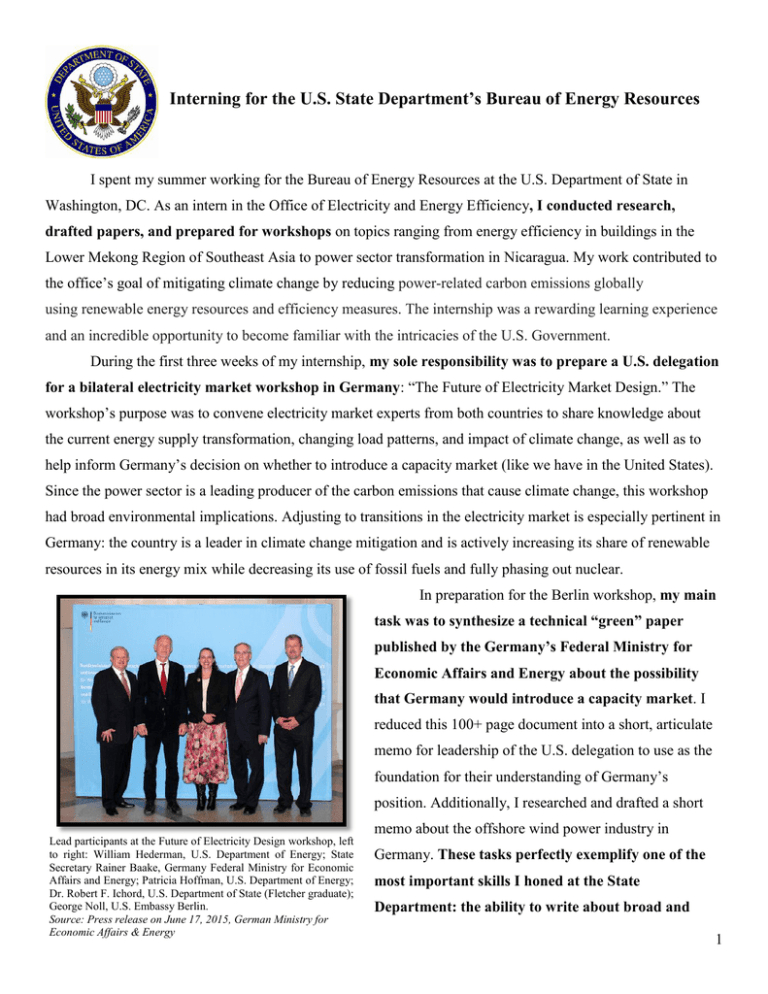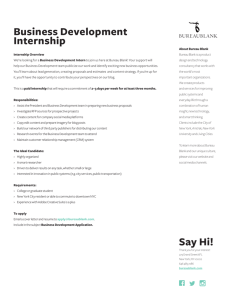Interning for the U.S. State Department`s Bureau of Energy Resources
advertisement

Interning for the U.S. State Department’s Bureau of Energy Resources I spent my summer working for the Bureau of Energy Resources at the U.S. Department of State in Washington, DC. As an intern in the Office of Electricity and Energy Efficiency, I conducted research, drafted papers, and prepared for workshops on topics ranging from energy efficiency in buildings in the Lower Mekong Region of Southeast Asia to power sector transformation in Nicaragua. My work contributed to the office’s goal of mitigating climate change by reducing power-related carbon emissions globally using renewable energy resources and efficiency measures. The internship was a rewarding learning experience and an incredible opportunity to become familiar with the intricacies of the U.S. Government. During the first three weeks of my internship, my sole responsibility was to prepare a U.S. delegation for a bilateral electricity market workshop in Germany: “The Future of Electricity Market Design.” The workshop’s purpose was to convene electricity market experts from both countries to share knowledge about the current energy supply transformation, changing load patterns, and impact of climate change, as well as to help inform Germany’s decision on whether to introduce a capacity market (like we have in the United States). Since the power sector is a leading producer of the carbon emissions that cause climate change, this workshop had broad environmental implications. Adjusting to transitions in the electricity market is especially pertinent in Germany: the country is a leader in climate change mitigation and is actively increasing its share of renewable resources in its energy mix while decreasing its use of fossil fuels and fully phasing out nuclear. In preparation for the Berlin workshop, my main task was to synthesize a technical “green” paper published by the Germany’s Federal Ministry for Economic Affairs and Energy about the possibility that Germany would introduce a capacity market. I reduced this 100+ page document into a short, articulate memo for leadership of the U.S. delegation to use as the foundation for their understanding of Germany’s position. Additionally, I researched and drafted a short memo about the offshore wind power industry in Lead participants at the Future of Electricity Design workshop, left to right: William Hederman, U.S. Department of Energy; State Secretary Rainer Baake, Germany Federal Ministry for Economic Affairs and Energy; Patricia Hoffman, U.S. Department of Energy; Dr. Robert F. Ichord, U.S. Department of State (Fletcher graduate); George Noll, U.S. Embassy Berlin. Source: Press release on June 17, 2015, German Ministry for Economic Affairs & Energy Germany. These tasks perfectly exemplify one of the most important skills I honed at the State Department: the ability to write about broad and 1 complex topics in a comprehensive, succinct, and straightforward way, usually in the format of a memo no longer than two or three pages. By working on this workshop, I also learned about some of the secondary consequences that can arise when implementing climate change mitigation goals through reform of the electricity industry. After the Germany workshop concluded, I spent most of my internship writing briefing papers (including memos) to prepare the Bureau’s principals for meetings, workshops, and conferences with interlocutors from other governments or the private sector. When the Bureau’s Principal Deputy Assistant Secretary Mary Warlick traveled to Serbia and Macedonia to discuss energy security, I was tasked with drafting the briefing paper about the Serbian power industry. I researched technical information about Serbia’s electricity sector and synthesized this information within the political and economic contexts of the country. My paper included a short discussion about Serbia’s renewable energy goals as well as the country’s role in coal production and regional coal Principal Deputy Assistant Secretary of State, Bureau of Energy Resources, Mary Warlick (Fletcher 1982) discussing energy security with Prime Minister of Serbia Aleksandar Vučić on July 6, 2015. Source: Bureau of Energy Resources official Twitter feed, @EnergyAtState trade. I enormously enjoyed my time at the State Department and look forward to bringing my experience to the classroom at Fletcher this year. Additionally, the internship will certainly be instrumental in my intended career in energy with the Federal Government: o I contributed to energy diplomacy in the real world, learned firsthand about the roles of various sections of the State Department, and o made connections with colleagues both at State and in other government agencies that expanded my ideas for career options after graduation. I would not have been able to complete this internship without generous financial support from CIERP, made possible through a donation from BNGF Climate Results Fund. Thank you! Lynn Massengill The Fletcher School, class of 2016 2

